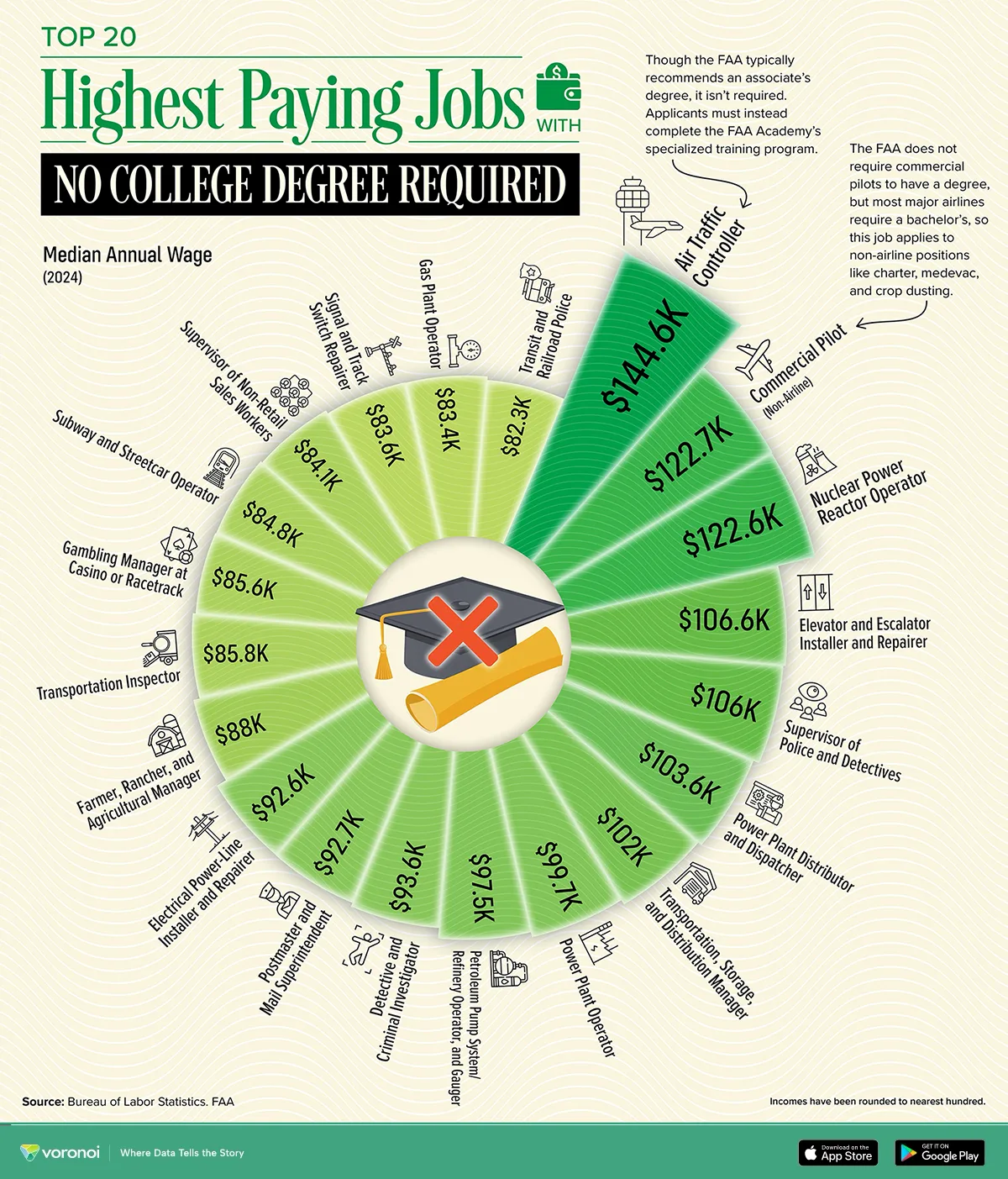![]()
See this visualization first on the Voronoi app.

The 20 Highest Paying Careers That Don’t Need a College Degree
This was originally posted on our Voronoi app. Download the app for free on iOS or Android and discover incredible data-driven charts from a variety of trusted sources.
- Air traffic controllers top the list with a median wage of $144,580.
- Several skilled trades like elevator repair and power plant operation pay over $100,000 annually.
- Rising demand and shifting perspectives are making blue-collar jobs more attractive to younger generations.
The U.S. labor market is evolving, and so are the pathways to high-paying careers. While a college degree has long been considered essential for financial success, new data from the Bureau of Labor Statistics shows that numerous careers offer six-figure salaries without requiring a four-year diploma.
The visualization above, by Julie Peasley, breaks down the top 20 highest paying jobs that don’t require a college degree, from nuclear reactor operators to transportation managers.
Here are the top 20 jobs by median salary:
| Rank | Occupation (U.S.) | Median Annual Wage (2024, USD) |
|---|---|---|
| 1 | Air Traffic Controller | $144,580 |
| 2 | Commercial Pilot (Non-Airline) | $122,670 |
| 3 | Nuclear Power Reactor Operator | $122,610 |
| 4 | Elevator and Escalator Installer and Repairer | $106,580 |
| 5 | First-Line Supervisor of Police and Detectives | $105,980 |
| 6 | Power Plant Distributor and Dispatcher | $103,600 |
| 7 | Transportation, Storage, and Distribution Manager | $102,010 |
| 8 | Power Plant Operator | $99,670 |
| 9 | Petroleum Pump System Operator, Refinery Operator, and Gauger | $97,540 |
| 10 | Detective and Criminal Investigator | $93,580 |
| 11 | Postmaster and Mail Superintendent | $92,730 |
| 12 | Electrical Power-Line Installer and Repairer | $92,560 |
| 13 | Farmer, Rancher, and Agricultural Manager | $87,980 |
| 14 | Transportation Inspector | $85,750 |
| 15 | Gambling Manager at Casino or Racetrack | $85,580 |
| 16 | Subway and Streetcar Operator | $84,830 |
| 17 | First-line Supervisor of Sales Workers (Non-retail) | $84,130 |
| 18 | Signal and Track Switch Repairer | $83,600 |
| 19 | Gas Plant Operator | $83,400 |
| 20 | Transit and Railroad Police | $82,320 |
Air traffic controllers ($144,580), commercial pilots ($122,670), and nuclear reactor operators ($122,610) take the top three spots, with many trade-heavy and supervisory roles also appearing above the $100,000 threshold.
The Rise of High-Paying Blue-Collar Careers
A growing number of Americans are reconsidering the cost-benefit equation of college, especially as student debt burdens rise. Trade jobs are not only paying more, but also seeing increased interest from Gen Z workers looking for faster, debt-free entry into the workforce.
Many of these roles require certification, apprenticeships, or specialized training. For example, air traffic controllers must complete a rigorous FAA training program, but no degree is necessary. Similarly, commercial pilots flying non-airline routes, such as charter or medevac, often need licenses but not a bachelor’s degree.
Skilled Trades Dominate the List
What stands out in this ranking is the sheer number of high-paying skilled trades:
- Elevator and escalator installers ($106,580)
- Power plant operators ($99,670)
- Petroleum pump system operators ($97,540)
These careers offer strong wages without the need for a college degree, often relying on apprenticeships or vocational training instead.
Another key factor driving renewed interest in these careers is their reputation as being relatively “AI-proof.” Unlike many white-collar jobs facing disruption from artificial intelligence and automation, skilled trades typically require hands-on work in dynamic environments, making them less susceptible to technological replacement. For many young workers, this blend of job security and solid pay is an increasingly attractive proposition.
Education vs. Earnings
While these careers are exceptions to the rule, it’s still true that more education often leads to higher earnings on average. Our previous post, Charted: U.S. Salary by Education Level, shows how median income rises steadily with each level of formal education.
Learn More on the Voronoi App ![]()
View the related post: How Much More Does a Graduate Degree Earn by State?